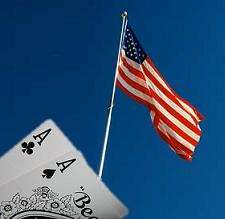Political Pundit Charles Murray Argues “Poker Is America”
 Pundit and author Charles Murray published an op-ed in The New York Times on Sunday titled “Poker Is America” in which he identified several positive aspects of the game while championing it as particularly representative of American culture.
Pundit and author Charles Murray published an op-ed in The New York Times on Sunday titled “Poker Is America” in which he identified several positive aspects of the game while championing it as particularly representative of American culture.
A frequent column writer who often addresses politics, education, and sociological issues, Murray is perhaps best known as the co-author of the controversial 1994 book The Bell Curve: Intelligence and Class Structure in American Life. There he and Richard J. Herrnstein addressed both the causes for human intelligence (positing that it comes from both nature and nurture) and the way intelligence affects individuals’ status in society. The book ignited a variety of debates, the most heated concerning its discussion of possible connections between race and intelligence.
Murray’s article extrapolates from his own poker playing a few ideas about how the game is often played and how those elements of the game seem to him especially representative of American culture. Most notable for Murray is how in his experience the poker table often tends to attract a demographically eclectic group, with representatives of various races and ethnicities, a variety of age and income brackets, and both sexes routinely occupying the seats around the table.
“A poker table is America the way that television commercials portray it but it seldom is,” says Murray.
From there Murray moves into discussing the special kind of social interaction that distinguishes poker, noting what for him tends to be mostly conflict-free table talk that avoids politics in favor of talking about sports or other less contentious conversational subjects. He also mentions the game’s etiquette and the “mannerly” modes of behavior associated with good sportsmanship (e.g., not gloating after a lucky win or complaining after a bad beat).
Some might find Murray’s characterization of the game to be more romantic than realistic in certain particulars. Indeed, he claims never to have “experienced a moment of tension arising from anything involving race, class or gender” at the poker table. But his overall point that the game not only brings together people from a wide variety of backgrounds but also provides a context for friendly interaction is nonetheless adequately made.
The latter half of the piece then finds Murray further praising our favorite card game by exploring how “Poker tables are pure meritocracies,” yet another facet of poker that for Murray makes it especially representative of America.
Despite the variety of backgrounds exhibited by those sitting around a poker table (including sometimes disparate educational backgrounds), each individual must nonetheless prove him or herself amid the game’s intellectual and psychological challenges. As a Ph.D. from M.I.T., Murray clearly gets a kick out of the way the game has a way of “putting overeducated elitist snobs in their place.”
In addition to lauding the game’s other merits, Murray celebrates poker for providing a mechanism by which people from different backgrounds can come together. He ends his piece alluding to his recent, also controversial title Coming Apart: The State of White America, 1960-2010 in which among other topics he addresses a kind of self-segregation of the upper class from the lower class. In a half-serious, half-joking way, Murray suggests ensuring poker not only be legal, but “mandatory” as a kind of socializing tool.
In the end, Murray’s piece recalls points that have been made before by writers like Al Alvarez and James McManus regarding some of the ways poker uniquely represents American culture.
For instance, Alvarez likewise discusses poker’s status as “The American Game” in the first chapter of his 2001 book Poker: Bets, Bluffs, and Bad Beats, emphasizing in particular the way poker “is a truly democratic activity” in which “race, color, creed, what you look like, where you come from, and what you do for a living are of no interest at all.” McManus, too, makes similar points about poker’s “democratic fairness” in his 2009 Cowboys Full, a book that likewise argues in various additional ways how poker is an integral part of American history and culture.
Perhaps inspired by recent legislative machinations in Nevada and New Jersey with regard to online poker, Murray clearly wished to write a pro-poker piece that highlighted poker’s special connection to American ideals and values. The piece may strike some readers as somewhat idiosyncratic, focusing largely on personal anecdotes with the argument mostly only being implied. And, of course, Murray has his opponents, too, who will be less tolerant of his views thanks to other arguments he has made on other issues in the past.
Still, the timing of a pro-poker piece in such a prominent mainstream publication shouldn’t hurt the cause of those hoping to legalize the online game and/or increase its popularity in the U.S.



















COMMENTS